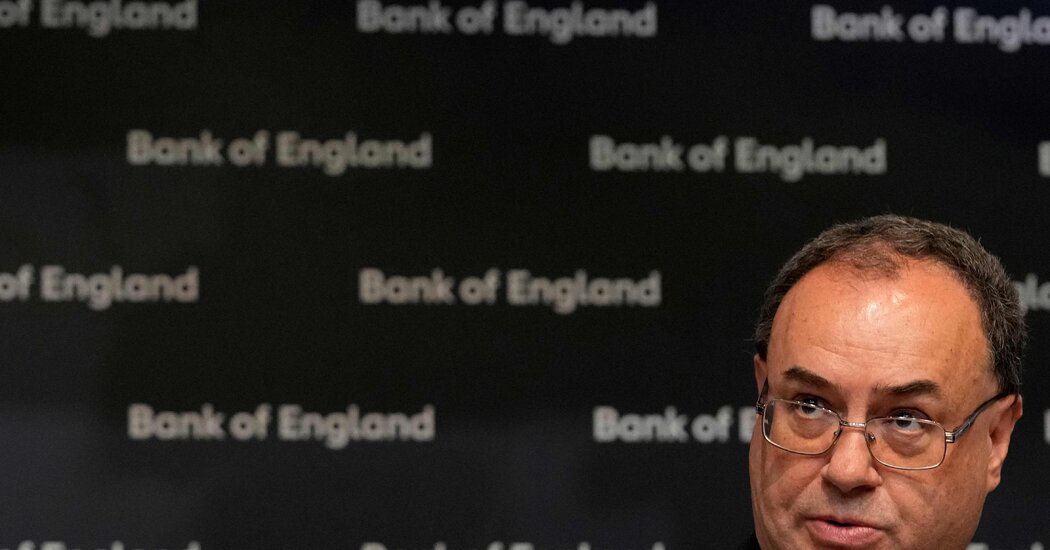As prices for energy, food and commodities rise after Russia’s invasion of Ukraine, the impact is being felt sharply around the world. In Britain, the central bank pushed interest rates to their highest level in 13 years on Thursday, in an effort to arrest rapidly rising prices even as the risk of recession is growing.
The bank predicted that inflation would rise to its highest level in four decades in the final quarter of this year, and that the British economy would shrink by nearly 1 percent.
“Global inflationary pressures have intensified sharply in the buildup to and following the invasion,” Andrew Bailey, the governor of the Bank of England, said on Thursday. “This has led to a material deterioration in the outlook,” he added, for both the global and British economies. On an annual basis, the economy would also shrink next year.
The Bank of England raised interest rates to 1 percent from 0.75 percent, their highest level since 2009. Three members of the nine-person rate-setting committee wanted to take a more aggressive step and raise rates by half a percentage point. The Bank of England has raised rates at every policy meeting since December.
Prices rose 7 percent in Britain in March from a year earlier, the fastest pace since 1992. The central bank predicts the inflation rate will peak above 10 percent in the last quarter of the year, when household energy bills will increase again after the government’s energy price cap is reset in October. Ten percent would be the highest rate since 1982.
The rapidly changing landscape was reflected in the prospects for economic growth. In 2023, the bank now predicts, the economy will shrink 0.25 percent instead of growing 1.25 percent, which it predicted three months ago.
On Wednesday, policymakers at the U.S. Federal Reserve increased interest rates half a percentage point, the biggest jump in 22 years, in an effort to cool down the economy quickly as inflation runs at its fastest pace in four decades. The U.S. central bank also said it would begin shrinking its balance sheet, allowing bond holdings to mature without reinvestment.
On Thursday, the Bank of England said its staff would begin planning to sell the government bonds it had purchased, but a decision on whether to commence these sales hasn’t been made. The bank stopped making new net purchases at the end of last year after buying 875 billion pounds ($1.1 trillion) in bonds. The bank said it would provide an update in August.
The outlook for the global economy has been rocked by the war in Ukraine, which is pushing up the price of energy, food and other commodities such as metals and fertilizer. The Covid-19 pandemic continues to disrupt trade and supply chains, particularly from shutdowns stemming from China’s zero-Covid policy. Last month, the International Monetary Fund slashed its forecast for global economic growth this year to 3.6 percent from 4.4 percent, which was predicted in January.
The challenge for policymakers in Britain is stark. The Bank of England has a mandate to achieve a 2 percent inflation rate. At the same time, there is evidence that the economy is already slowing down, consumer confidence is dropping and businesses are worried that price increases will depress consumer spending, a key driver of economic growth. With inflation at its highest level in three decades and wage growth unable to keep up, British households are facing a painful squeeze on their budgets.
Household disposable income, adjusted for inflation, is expected to fall 1.75 percent this year, the second largest drop since records began in 1964, the bank said. The central bank’s challenge is to slow inflation to ease the pressure on households and businesses without cooling the economy too much and tipping it into a recession.
“Monetary policy must, therefore, navigate a narrow path between the increased risks from elevated inflation and a tight labor market on one hand, and the further hit to activity from the reduction in real incomes on the other,” Mr. Bailey said on Thursday.
Weighing that alternative, policymakers figured that pressures on costs for business and prices for consumers would persist unless they took action. Companies expect to strongly increase the selling prices for their goods and services in the near term, after the sharp rises in their expenses, the bank said. At the same time, inflation could become more entrenched because the unemployment rate is low, forcing companies to raise wages to meet their hiring needs.

